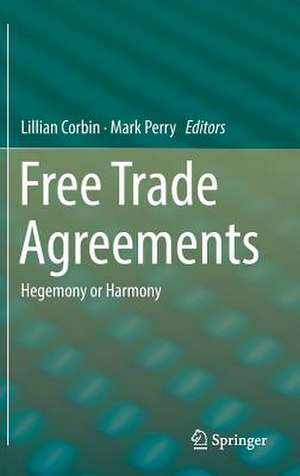Free Trade Agreements: Hegemony or Harmony
Editat de Lillian Corbin, Mark Perryen Limba Engleză Hardback – 9 noi 2018
This book brings together international perspectives on free trade issues that affect civil society from the general populace to the governments of nations, and is relevant not only for lawyers, but also policymakers, international actors and businesses, as well as those with a general interest in free trade agreements.
The book examines the manifestation of the concept of free trade in agreements, such as the Trans-Pacific Partnership (TPP), Regional Comprehensive Economic Partnership (RCEP), and China-Australia Free Trade Agreement (ChAFTA). It asks whether such agreements are entered into for the purposes of enhancing trading relationships between partner nations, strengthening commercial ties, and fostering economic growth; or are they sometimes used merely for local political outcomes of the most influential nations.
| Toate formatele și edițiile | Preț | Express |
|---|---|---|
| Paperback (1) | 786.71 lei 38-44 zile | |
| Springer Nature Singapore – 15 dec 2018 | 786.71 lei 38-44 zile | |
| Hardback (1) | 945.79 lei 6-8 săpt. | |
| Springer Nature Singapore – 9 noi 2018 | 945.79 lei 6-8 săpt. |
Preț: 945.79 lei
Preț vechi: 1153.39 lei
-18% Nou
Puncte Express: 1419
Preț estimativ în valută:
180.97€ • 189.46$ • 149.75£
180.97€ • 189.46$ • 149.75£
Carte tipărită la comandă
Livrare economică 05-19 aprilie
Preluare comenzi: 021 569.72.76
Specificații
ISBN-13: 9789811330377
ISBN-10: 9811330379
Pagini: 152
Ilustrații: XVI, 161 p. 3 illus.
Dimensiuni: 155 x 235 mm
Greutate: 0.45 kg
Ediția:1st ed. 2019
Editura: Springer Nature Singapore
Colecția Springer
Locul publicării:Singapore, Singapore
ISBN-10: 9811330379
Pagini: 152
Ilustrații: XVI, 161 p. 3 illus.
Dimensiuni: 155 x 235 mm
Greutate: 0.45 kg
Ediția:1st ed. 2019
Editura: Springer Nature Singapore
Colecția Springer
Locul publicării:Singapore, Singapore
Cuprins
1.Turbulent times for FTAs: Australia and the Region
Lillian Corbin and Mark Perry
2.The Trans-Pacific Partnership Agreement and The Regional Comprehensive Economic Partnership: a battleground for competing hegemons?
Jane Kelsey
3.Copyright Overprotection vs Open Science: the Role of Free Trade Agreements
Roberto Caso and Paolo Guarda
4.South Korea’s Agricultural Trade Dilemma: Open Markets or Protectionism? Beyond the China-South Korea Free Trade Agreement
Ying Chen
5.China’s Response to Protectionism: PPP under “One Belt One Road”
Hongyu Fu
6.Breeding Exemption in Plants Under Intellectual Property Regimes
Zhiqian Wan and Mark Perry
7.The China-Australia Free Trade Agreement and the Choice of Intellectual Property Interest Balance in the two countries
Henry YAN
8.Denouncing trade agreements that validate pharmaceutical developers’ term extensions
Sunita Tripathy
Notă biografică
Lillian Corbin is Head of the School of Law at the University of New England, Armidale, Australia. Her research interests lie in legal ethics, legal education, and lawyer regulation.
Mark Perry is Professor in the School of Law at the University of New England, Armidale, Australia. His research focuses on the nexus of technology and law, with a current focus on law in high-tech agriculture, biotechnology, and the governance of data.
Mark Perry is Professor in the School of Law at the University of New England, Armidale, Australia. His research focuses on the nexus of technology and law, with a current focus on law in high-tech agriculture, biotechnology, and the governance of data.
Textul de pe ultima copertă
This book brings together international perspectives on free trade issues that affect civil society from the general populace to the governments of nations, and is relevant not only for lawyers, but also policymakers, international actors and businesses, as well as those with a general interest in free trade agreements.
The book examines the manifestation of the concept of free trade in agreements, such as the Trans-Pacific Partnership (TPP), Regional Comprehensive Economic Partnership (RCEP), and China-Australia Free Trade Agreement (ChAFTA). It asks whether such agreements are entered into for the purposes of enhancing trading relationships between partner nations, strengthening commercial ties, and fostering economic growth; or are they sometimes used merely for local political outcomes of the most influential nations.
Caracteristici
Explores a variety of FTA-related issues
Brings together international perspectives on an issue that affects all levels of civil society
Is relevant not only for lawyers, but also policymakers, international actors, and businesses
Brings together international perspectives on an issue that affects all levels of civil society
Is relevant not only for lawyers, but also policymakers, international actors, and businesses
